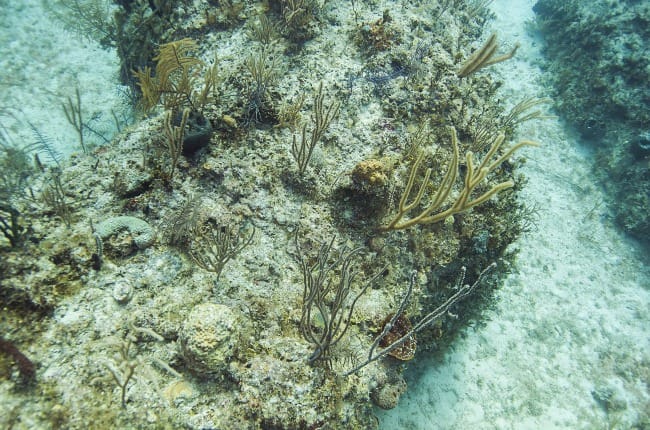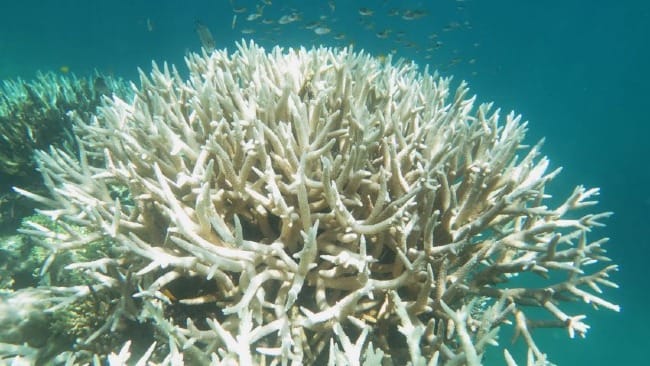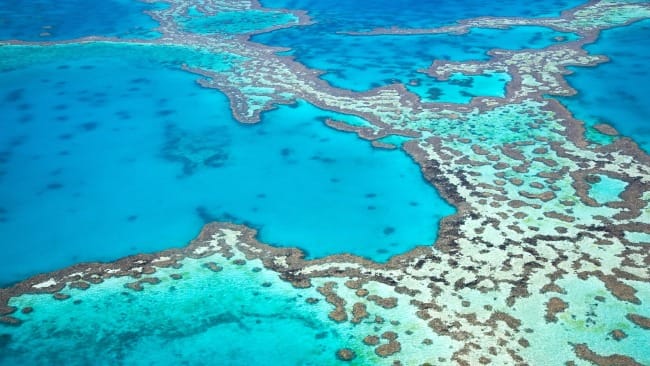In James' Monday post, he shared excerpts of Hannah Malcolm's introduction from the book, Words for a Dying World, a collection of essays by various authors about grief for the world as it has been. Today I share excerpts from a second essay in that collection.
The essay's author, Tim Gordon, is a marine biologist at the University of Exeter and at the Australian Institute of Marine Science; his research focuses on the impacts of climate change on tropical coral reefs. Circlewood's other media endeavor, our Earthkeepers podcast, recently produced a podcast featuring a conversation with the editor of this essay collection. If you haven't listened to it yet, the link is at the end of this post.
Below are two extended excerpts from Tim Gordon's essay, "Grief in the Silent Sea."
If creation reveals the glory of the Lord, then the Great Barrier Reef must be a canonical mainstay.

When you strap on a scuba tank and plunge beneath the waves, you undergo a psychedelic assault on the senses. There are more colours here than you knew existed, painted on to a physical structure more complex than you thought possible. Shoals of brightly coloured fish shimmer in the sunbeams as they dart among clouds of microscopic plankton. Shrimp and crabs scuttle among the branching undergrowth, nonplussed by the frantic battles of territorial damselfish raging around them. A stingray glides on fluttering wings over a patchwork of vibrant corals, as a turtle lifts itself towards the surface with a lazy beat of its flippers. Predatory grouper lurk in the shadows, mouths held open for daring cleaner-fish to swim through their gills and pick morsels off their razor-sharp teeth. Crescent fins slice through the water as sharks cruise effortlessly along the reef crest. Life teems around you, in greater diversity here than anywhere else on earth. Around every corner, behind every outcrop, beneath every overhang, are life forms ‘most beautiful and most wonderful1 countless additions to this ecological miracle. Previous authors have described this place as being filled with ‘thunderclaps of wonder’;2 trying to take it all in at once is overwhelming to the point of breathlessness. Before you know it, you’ve sucked your scuba tank empty and you must return ‘topside,’ left spluttering for air and the words to describe all that you’ve seen.

My work as a marine biologist is to record and understand the sounds of this underwater Eden. Jacques Cousteau once described the sea as a ‘silent world,’ but this could hardly be further from the truth. When we do choose to listen to what is already so visually overwhelming, we discover a whole new dimension. The clawclicks of thousands of snapping shrimp form an endless crackle, like a backing track that is decorated by the pops, trills, growls and hums of fishes. As I swim through the reef in the early morning, I hear the joyful dawn chorus of its inhabitants, just as you hear birdsong when you walk through a forest. Some of these sounds are heart-warmingly familiar; the chatter of a clownfish family; the whoop of an Ambon damselfish; the purrs of sergeant majors; the buzz of a riled-up dusky farmerfish and perhaps even the far-off songs of whales in the deep. Other sounds are less familiar; whistles and grunts from anonymous singers that pique my curiosity and fill my mind with wonder. Together, this collection of sounds forms a biological symphony that echoes many of the psalms: ‘I sing for joy at what your hands have done. How great are your works, Lord’; ‘the sea, vast and spacious, teeming with creatures beyond number’; ‘Lord, our Lord, how majestic is your name in all the earth!’3 The reef sound rings in my ears, lifting my heart upwards and inspiring me to join in praise of its composer.
Or rather, it used to.

Today, I survey graveyards. My colleagues and I are measuring the fastest rates of destruction ever documented in the 24-million year history of tropical coral reefs. Ravaged by relentless marine heatwaves, corals around the world are bleaching white, dying and fading to grey. As we descend beneath the waves, we gaze in horror at the wreckage around us. Limestone skeletons stand where reefs once buzzed with life, like tombstones in the haunting emptiness. Shrouds of filamentous algae hang off them like grave clothes. And for the first time, we record a sound that has never before been heard on coral reefs: silence. The underwater symphony has been stopped in its tracks. The bubbles from our exhaled breaths echo around the eerie quiet; a painful reminder of all that has been lost. We return topside, sombre and speechless. Songs of praise turn to silent despair.

In the one-minute video below, Gordon compares the sounds of a healthy reef and the silence of a dead or dying one—as he describes in the essay, the "songs of praise turn to silent despair."
Do you hear the praise the healthy reef is singing? Do you feel the grief of the reef going silent?
Gordon ends his essay with the thoughts below.
The incarnate Jesus who cried with people on earth doesn’t deal in pious indifference. Instead, he called his disciples to act with him, in the midst of the painful here-and-now. Throughout his life, Jesus fed the hungry and healed the sick, praying ‘Your will be done on earth as it is in heaven’. In doing so, he didn’t remove all of suffering from the world immediately – disease is still rampant, injustice still pervades and people still suffer, curse and cry today. But he did point to a better future.
As a marine biologist, this reminds me that my small actions are far from worthless. I may not be able to bring dead corals back to life, regrow the Great Barrier Reef or undo the ghastly results of my surveys. The damage is too extensive. But I can work to protect what still remains, replace some of what has been lost, and make active changes to protect people and environments around the world. It won’t remove environmental destruction from the planet entirely, but it will make a difference where I am and point to a better future. Just as Jesus brought God’s love to a small corner of Palestine, I can bring healing to small corners of the world today. In their own way, both point to an ultimate resurrection.

Jesus never scuba-dived on a dying Great Barrier Reef. He never saw the colours fade, the architecture collapse and the symphony silenced. But I think his words and actions at Lazarus’ tomb show us how he might respond to today’s environmental crises. If, while on earth, Jesus had seen the riches of creation reduced to a rubble field, he surely would have wept with us for its loss. He surely would have pointed us to its future redemption. And he surely would have used this as motivation to protect all that still remains of the planet’s wonders.
‘I am the resurrection and the life,’ said Jesus, as his cheeks shone with tears. One day, the sea will sing again.
All excerpts from "Words for a Dying World: Stories of Grief and Courage from the Global Church." Ed. Hannah Malcolm. London: SCM Press, 2019. Used with permission.
Feel free to leave a comment below or contact me directly at louise.conner@circlewood.online.
Louise
Click below to listen to the Earthkeepers podcast interview with Hannah Malcolm.

